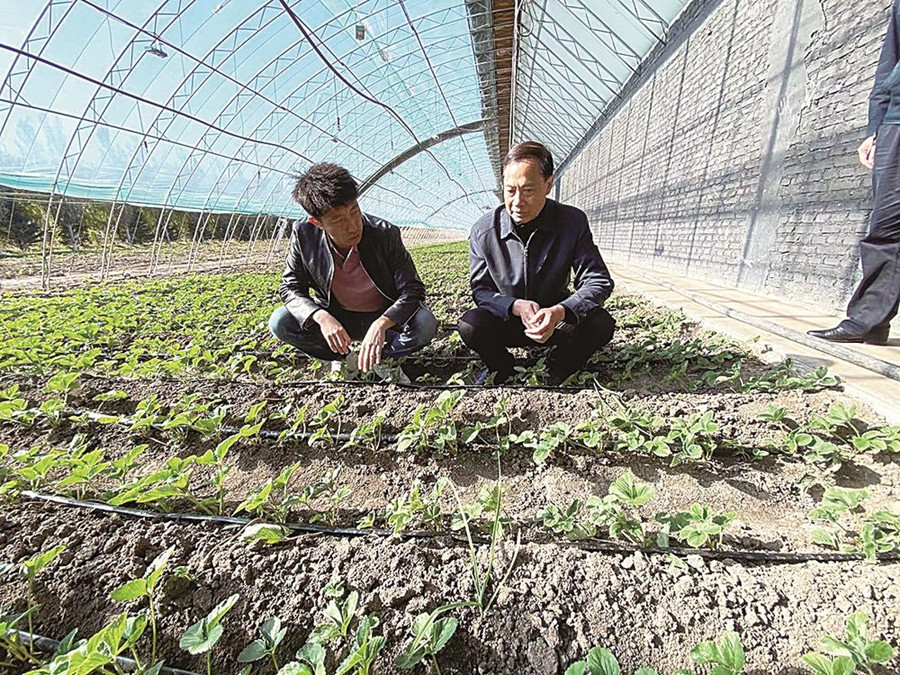Chen Mengshan: Remaining true to original aspirations

Chen Mengshan is a member of the National Committee of the Chinese People's Political Consultative Conference (CPPCC), member of the Committee on Proposals of the CPPCC National Committee, and former secretary of the Leading Party Members Group of the Chinese Academy of Agricultural Sciences. Currently, Chen is director of the State Food and Nutrition Consultant Committee, and president of the Chinese Association of Agro-Technical Economics. [Photo provided to cppcc.gov.cn]

Chen Mengshan at the research site [Photo provided to cppcc.gov.cn]
For Chen Mengshan, who has been engaged in issues related to agriculture, rural areas and farmers all his life, conducting investigations and surveys in rural areas has been his routine for decades.
Dedicated to rural areas
In September 2018, autumn grain harvest was imminent in Northeast China's Jilin province.
In the evening, when Chen and his research team were carrying out research on a rice company in Qianguo county, they learned about an important piece of information.
"The head of the company told us that the monthly demand of a client from the southwestern region had increased from 300 metric tons two or three years ago to the current 600 tons, pushing the company's annual supply up from 7,000 to 8,000 tons," Chen recalled. This number immediately caught the attention of the research team.
The next day, another local rice company shared similar information. The company found that, over the past two years, there had been an increase in new clients from Southwest China, whose average annual demand of rice was up by 50 percent. In addition, another cooperative in Qijiazi village sold 60 percent of its high-quality rice to Southwest China's Yunnan, Guizhou and Sichuan provinces, and the absolute sales volume had also been increasing.
The research team swiftly came to a preliminary conclusion: Yunnan, Guizhou and Sichuan are traditional grain production-sales balance areas in China, and the surge in the amount of transferred grain meant that the production-sales balance had been broken.
To verify their conclusion, Chen led a team to Yunnan and Guizhou the following year. On Yanjing Mountain, at an altitude of 3,000 meters in Miluo town, Shuicheng district, Liupanshui city of Guizhou, a farmer, who was working in a kiwi orchard, told the team his situation. "My grain field has been used to plant fruit trees. We don’t produce rice anymore but purchase rice at the market."
Chen explained that "It doesn't seem as though there is anything wrong with this phenomenon, but the impact of potential adverse weather and sudden disasters is unpredictable. We have no idea how much risk it will pose to our food security."
After the survey, the team immediately wrote a research report, highlighting that grain production-sales balance areas should be irreversibly changed back to grain sales areas, and that it was urgent to strengthen the food security guarantee mechanism.
This is just an epitome of Chen's investigations and research that have resulted in proposals over the years, and it shows the importance of repeated, long-term, and continuous investigations and research into issues related to agriculture, rural areas and farmers.
Chen stressed that, to tackle issues related to agriculture, rural areas and farmers, a deep understanding of these areas is a must. He has accumulated a lot of experience and would like to share his experience with young people without reservation.
He said that Chinese farmers in the vast countryside provide the direction of policy formulation, theoretical research and even social development, and their practices and creations often inspire him.
As an agricultural worker and a CPPCC member, Chen is a practitioner dedicated to the rural areas.
Voices of real needs
Since 2018, Chen has led his research team to carry out research and survey work in counties and villages across the country, and one of the main research focuses is food security, according to him.
Chen said that over the past five years, they have been to the major grain-producing areas of Heilongjiang, Liaoning, Shandong, Hebei, Henan, Anhui and Jiangxi provinces, the production and sales balanced areas of Yunnan, Guizhou, Shaanxi and Gansu, and the major grain-consuming areas of Fujian, Guangdong and Jiangsu provinces.
Through these surveys, Chen conducted an all-round, multi-angle, and three-dimensional study on China’s grain issues, forming typical cases of grain development, basic materials and research reports.
In addition, Chen carried out special research on spring plowing, summer grain, and autumn harvest based on the seasons. The surveys focused on grain areas and agricultural materials prices in spring, wheat harvest and market operation in summer, and grain harvest and corn and rice markets in autumn.
"Conducting field surveys in the countryside is both physical and mental work. You have to keep going, asking, and looking; and at the same time keep writing and thinking," he said.
As the surveys advance, it is also necessary to repeatedly think about the original idea and whether the previous idea is feasible, is there a new way, or can it be further adjusted and improved, Chen added.
Over the past five years, the survey team led by Chen has established direct contact with more than 600 front-line grain production and operation entities. They have the production micro-data on more than 1,000 grain farmers in over 90 villages across 12 provinces. In addition, they have built up a database of grain subjects and grain growing households.
Based on in-depth research on major grain-producing counties, Chen has put forward many suggestions related to the national economy and people's livelihoods through channels such as proposals, speeches, gathering public opinion, conducting special reports, and discussions.
For example, Chen found that many grain processing enterprises in major production areas are facing greater operating pressures, and are hoping to adjust from "industrial electricity pricing" to "agricultural electricity pricing", which will reduce the cost of grain processing by one cent per catty.
According to Chen, this adjustment will help these companies increase their profits by 10 percent. More importantly, this move will effectively promote the internal circulation of grain, increase industrial income, and boost the economy of the production area.
Therefore, Chen submitted a proposal on adjusting the power consumption of grain processing enterprises in the grain production area to agricultural power pricing during the Fifth Session of the 13th CPPCC National Committee, which received the attention of the competent authorities.
"Only by working in rural areas, having real experience, and understanding true practices, can we speak on the needs of people in rural areas," Chen said.
Hard work for rural vitalization
Chen said, "The central government has paid more attention to food security over the past five years."
In the past five years, China's grain output has remained at more than 650 billion kilograms, contributing more than 20 percent to the annual increase in global grain output. In 2022, the per capita grain possession was 483 kg, which is higher than the internationally recognized food security line of 400 kg. The self-sufficiency rates of wheat and rice both exceed 100 percent, and the self-sufficiency rate of grain exceeds 90 percent.
"Stabilizing the production and supply of grain and important agricultural products, as well as comprehensively promoting rural vitalization, are the focus of this year's issues related to agriculture, rural areas and farmers," said Chen.
He stressed that cultivated land and seeds are "two vital points". Efforts should be made to ensure the quantity and quality of cultivated land, expand the area and improve the construction standards of high-standard farmland. Measures will be taken to promote the development of seed science and technology and make breakthroughs in cutting-edge core technologies.
It is also important to mobilize the governments' enthusiasm to pay attention to and the enthusiasm of the farmers for grain production," he explained.
Chen said "When strengthening the industrial chain, we should support the grain processing and food industries, and enhance the comprehensive profitability of grain farmers. By strengthening the supply chain, more efforts should be made to support Chinese grain enterprises to 'go global', promote the efficient and integrated coordination of domestic grain purchase, storage, processing and sales, and improve food security."
After the final victory in the tough battle against poverty, comprehensive rural vitalization has become the focus of issues related to agriculture, rural areas, and farmers.
"To promote rural vitalization in an all-round way, the increase of farmers' income is the central task, with the bottom line of preventing rural citizens returning to poverty on a large scale."
Chen said that he believes industrial revitalization is the top priority in rural vitalization. Only when there are industries in the countryside and farmers have an income, can more talents be attracted to the countryside.
"I should be like a soldier on the battlefield, sticking to my post no matter what I do and doing everything possible to overcome difficulties, regardless of fame and fortune." Chen has striven for the development of agriculture, rural areas, and farmers, just as he wrote in his diary in 2012.
Copyright © The National Committee of the Chinese People's Political Consultative Conference.
All rights reserved. Presented by China Daily.
京ICP备08100501号-1

